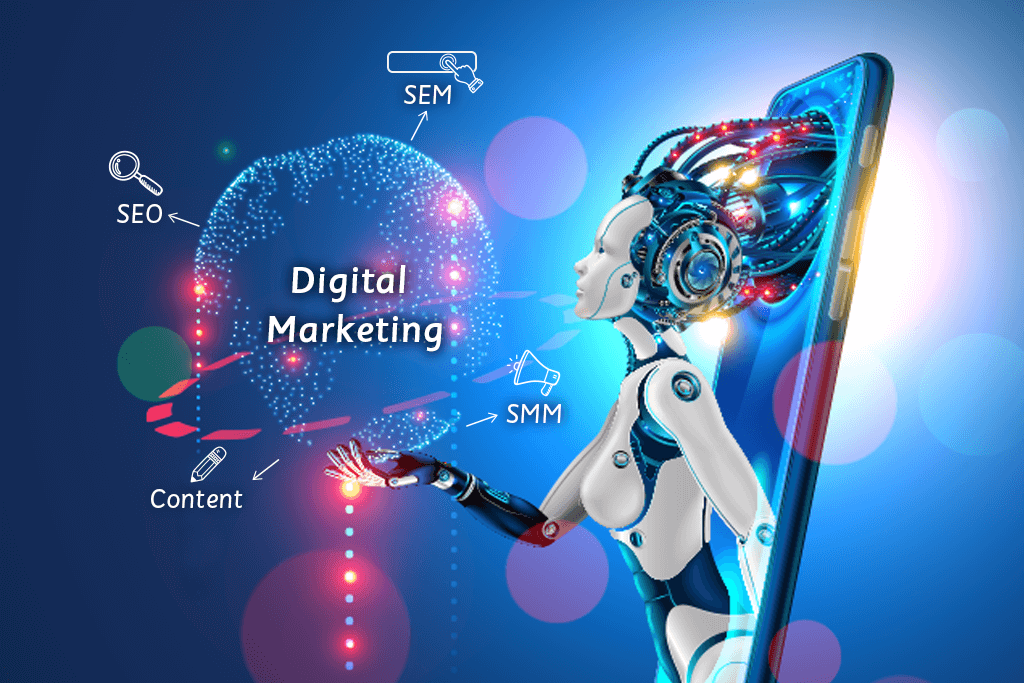Artificial Intelligence (AI) is revolutionizing the way businesses approach digital marketing. With its ability to process vast amounts of data, identify patterns, and make predictions, AI is helping companies to better understand their customers and create more effective marketing strategies.
One of the key areas where AI is having a significant impact is in the realm of personalization. By analyzing data on individual customers’ behavior, preferences, and demographics, AI can help companies to create highly targeted marketing campaigns that are more likely to resonate with each individual customer. For example, an e-commerce company can use AI to analyze customer browsing and purchase history and make product recommendations that are tailored to each individual customer’s preferences. This can help to increase customer engagement and sales.
Another area where AI is having a significant impact is in the realm of customer service. With the help of AI-powered chatbots, companies can provide quick, accurate, and personalized customer service at scale. Chatbots can be programmed to understand customer queries, provide answers, and even complete transactions, all without human intervention. This can help companies to reduce customer service costs and improve customer satisfaction.
AI is also helping companies to optimize their digital ad campaigns. By analyzing data on customer behavior and demographics, AI can help companies to identify the most effective target audience and ad placement, thus increasing the return on investment. Additionally, AI can help to automate ad bidding and budget allocation, making it possible for companies to bid on ad space in real-time and adjust their budgets based on performance.
AI is also proving to be an effective tool for social media marketing. By analyzing customer interactions on social media platforms, AI can help companies to identify the most effective content, hashtags, and influencers to reach their target audience. Additionally, AI can also be used to automate social media management tasks such as scheduling posts and responding to customer comments.
AI is also allowing companies to better understand their customers’ journey through the funnel and to identify the key touchpoints that are most likely to convert a lead into a sale. With the help of AI, companies can analyze customer behavior data and identify patterns and trends that can be used to optimize the customer journey, increasing the chances of conversion.
In conclusion, Artificial Intelligence is playing a crucial role in digital marketing. From personalization and customer service to ad optimization and social media management, AI is helping companies to better understand their customers and create more effective marketing strategies. As AI technology continues to improve and become more widely adopted, we can expect to see even more innovative applications of AI in digital marketing in the future.
However, it’s important to note that AI is not a magic solution for all marketing problems. Many companies have seen a lack of results from AI-based marketing campaigns due to poor data quality, lack of understanding of the technology, or unrealistic expectations. To fully leverage the benefits of AI in digital marketing, companies need to ensure they have access to high-quality data, understand the capabilities and limitations of the technology, and set realistic goals.
Moreover, as AI is becoming more prevalent in digital marketing, it’s also raising concerns about data privacy and ethical issues. Companies need to ensure they are complying with data privacy regulations and that they are using AI in an ethical manner, avoiding any biases or discriminatory practices.
In addition, it’s important to note that AI is not a replacement for human creativity and strategic thinking in marketing. AI can assist in providing insights and automating certain tasks, but ultimately, it’s the human marketer who needs to interpret the data, understand the customers and make strategic decisions.




